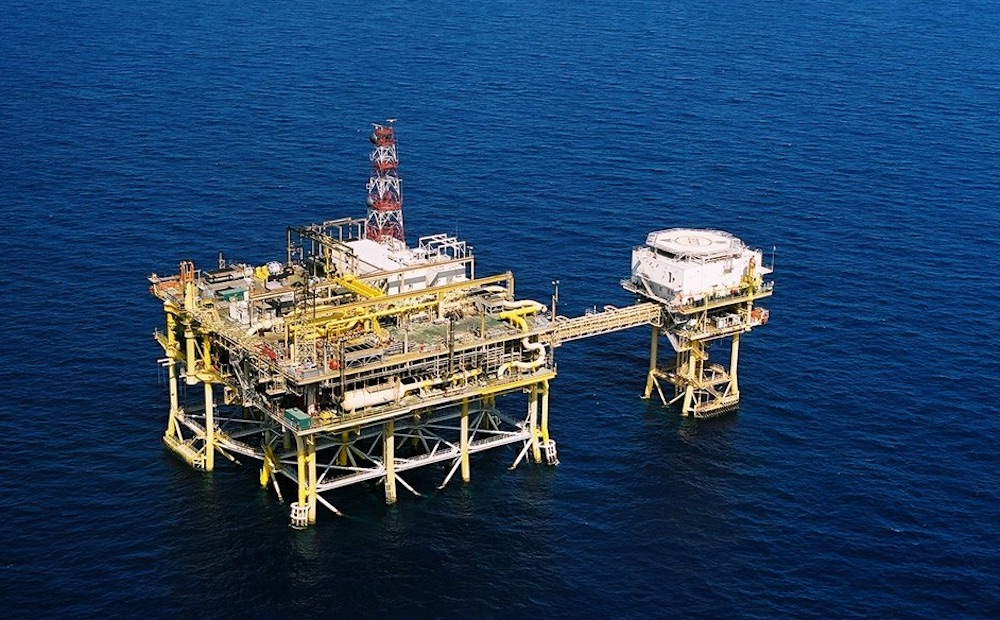
The Louisiana Offshore Oil Port is the only deepwater port in the Gulf of Mexico. Trafigura hopes to build a similar crude oil terminal capable of loading supermax vessels off the coastline of Padre Island National Seashore. Courtesy photo
Nueces County commissioners have joined a chorus of public opposition to a proposed crude oil loading terminal planned for the Gulf of Mexico. A resolution officially opposing Switzerland-based Trafigura’s proposal to build an offshore loading dock for crude oil was approved Jan. 7 during the commissioner’s first meeting of the new year.
Before voting to approve the resolution, however, commissioners deleted language supporting a land-based terminal on Harbor Island. The Port of Corpus Christi announced plans last month to build the new crude oil loading terminal on the small island that resides in both the Port Aransas and Aransas Pass city limits.
Trafigura’s terminal would be built 13 miles offshore from Padre Island National Seashore. A citizen-based opposition group, the Port Aransas Conservancy, has pitted the two projects against each other by supporting Trafigura’s offshore terminal and opposing the Harbor Island one. The group even ran page ads in the local daily paper supporting one against the other.
The Nueces County commissioners’ resolution included the following language to which Pct. 2 Commissioner Brent Chesney objected: “Under the full regulatory weight of state agencies, this project (Harbor Island terminal) is a safer and a far more sustainable alternative and will directly benefit Texas communities.”
“This is endorsing Harbor Island in my opinion,” Chesney said at the meeting. “I’m not ready to do that without a lengthy discussion and hearing from people in Port Aransas.”
Many Port Aransas residents object to the Harbor Island terminal, which they fear will have a negative impact on the environment, tourism, and the fishing industry. Sitting just across from the town center, the terminal would require the ship channel to be dredged to 75 feet to accommodate super-sized tankers with the capability of loading up to 2 million gallons of crude.
The bigger ships cause huge wakes that affect wetlands, wildlife, and homes along the channel. Increased traffic of the world’s biggest vessels would wreak havoc on the city, say those against the terminal.
Commissioners voted unanimously to remove the Harbor Island reference, which was copied from a Port of Corpus Christi resolution approved in December.
Similar resolutions by the port and San Patricio County commissioners have been sent to Gov. Greg Abbott and the General Land Office asking them to stop the project. The state would not have regulatory powers over the proposed offshore project since it would reside in federal waters; however, a governor can halt a deepwater port over concerns it would negatively impact the state or its residents.
Other local entities passing resolutions opposing the Trafigura terminal are Corpus Christi City Council, the Aransas Pass and Ingleside chambers of commerce, San Patricio County and Corpus Christi economic development corporations, the city of Gregory, and the Corpus Christi Convention and Visitors Bureau.
Trafigura submitted a permit application for its Texas Gulf Terminals Project to the Marine Division of the U.S. Department of Transportation on July 9, 2018. It is not the only proposed deepwater port in the Gulf.
Currently, only the Louisiana Offshore Oil Port, known as LOOP, is in operation in the Gulf of Mexico. It is the largest terminal of its kind in the world. Enterprise Products Partners of Houston plans to change that by building a bigger terminal south of Galveston. The pipeline needed would stretch about 80 miles.
Trafigura is already planning for its pipeline supply. It signed a contract last year to ship up to 300,000 barrels of crude a day from the Permian Basin to Corpus Christi via the Plains All American Pipeline’s Cactus II, scheduled to go online later this year.





